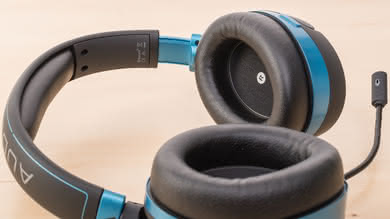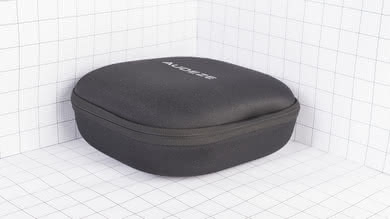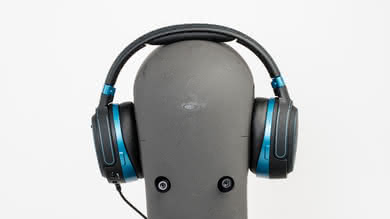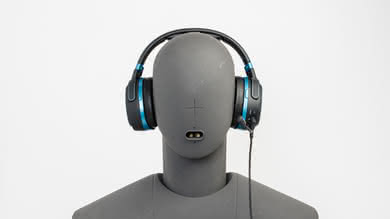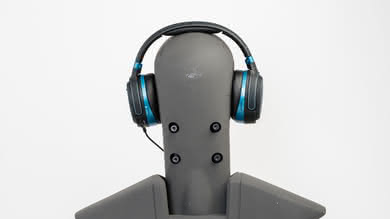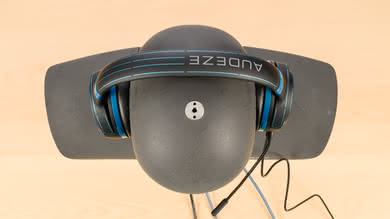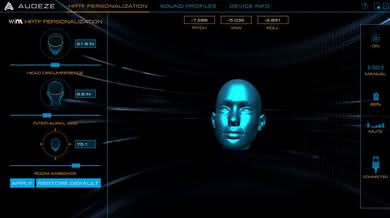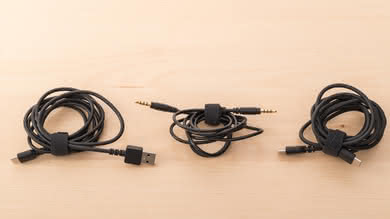The Audeze Mobius are good gaming headphones with unique features that set them apart from the competition. They have many connection options and a casual design that works wirelessly with your phone via Bluetooth. Their boom mic reproduces voices accurately and it's also detachable. They have a unique head tracking feature that, combined with the 3D audio, creates a simulated soundstage that's well-suited for gaming but couldn't be measured accurately with our test bench. Unfortunately, despite their casual design, they won't be the best headphones to use outdoors due to their bulky, cumbersome build and poor noise isolation.
Our Verdict
The Audeze Mobius are decent for neutral sound. They have a slightly bass-heavy sound that delivers extra thump, rumble, and boom. Their mid-range is also well-balanced and neutral, so vocals and lead instruments are accurately reproduced. However, a dip in the treble range can veil the upper harmonics of these sounds while dulling sibilants like cymbals. They don't produce a very immersive passive soundstage either, but with the 3D mode turned on, they have a much wider, artificial soundstage and can even track your head's position.
- EQ presets available.
- Lots of connection options.
- Unique 3D surround sound and head tracking feature.
- A bit too tight on the head.
- Plasticky and cumbersome design.
- Poor noise isolation.
The Audeze Mobius are okay for commuting. Although their closed-back, casual design is better suited for commuting than other gaming headsets, they don't isolate enough and are a bit too bulky and cumbersome to carry around on your person. On the upside, they also have a good control scheme.
- EQ presets available.
- Lots of connection options.
- Unique 3D surround sound and head tracking feature.
- A bit too tight on the head.
- Plasticky and cumbersome design.
- Poor noise isolation.
The Audeze Mobius are alright for sports. They're decently tight on the head so they don't move around much and they have a good control scheme. You can also use them wirelessly with your phone. Unfortunately, they're quite bulky and get quite hot when exercising which won't be ideal for more demanding activities.
- EQ presets available.
- Lots of connection options.
- Unique 3D surround sound and head tracking feature.
- A bit too tight on the head.
- Plasticky and cumbersome design.
- Poor noise isolation.
The Audeze Mobius are alright for office use. They don't block a lot of noise, so you hear what's going on around you, and they also leak a bit at high volumes and may distract your colleagues. However, they have a decent battery performance that'll last through long days at the office. You can also play audio while charging when connected to your PC.
- EQ presets available.
- Lots of connection options.
- Unique 3D surround sound and head tracking feature.
- A bit too tight on the head.
- Plasticky and cumbersome design.
- Poor noise isolation.
The Audeze Mobius aren't good for wireless gaming over their Bluetooth connection due to their latency.
The Audeze Mobius are good for gaming. They have a good sound, a great mic, and a wired design with low latency. They're also wireless via Bluetooth but won't work with your consoles that way and have a bit too much latency with this connection option. On the upside, they have mic and audio support when used wired via the analog 1/8" TRRS cable or USB-A to USB-C cable on PC, PS4, and PS5.
- EQ presets available.
- Lots of connection options.
- Unique 3D surround sound and head tracking feature.
- A bit too tight on the head.
- Plasticky and cumbersome design.
- Poor noise isolation.
- EQ presets available.
- Lots of connection options.
- Unique 3D surround sound and head tracking feature.
- A bit too tight on the head.
- Plasticky and cumbersome design.
- Poor noise isolation.
Changelog
- Updated Apr 24, 2023: We've added a comparison between these headphones and the Audeze Maxwell Wireless in Battery.
- Updated Feb 16, 2023: We've corrected an error regarding the charging port type in Battery.
- Updated Nov 01, 2021: Converted to Test Bench 1.5.
- Updated May 31, 2021: Updated the 'Bluetooth Version' in the 'Bluetooth' test.
Check Price
Popular Headphones Comparisons
The Audeze Mobius are good gaming headphones with many connection options and a fairly unique 3D feature. Like the Drop + THX Panda Wireless, they have a planar magnetic transducer and a closed-back enclosure. They're decently comfortable and have a durable, if plasticky, build quality. They also have a slightly bass-heavy sound profile that caters well to music and gaming and they're fairly easy to use with a good control scheme that works well when using wirelessly with your phone via Bluetooth. Unfortunately, their build quality doesn't quite reflect their price range, especially considering some of the cheaper headsets compared below. They also don't have the longest battery life, and their slightly bulky design isn't as outdoors-friendly as some of the other gaming headsets we've tested.
See our recommendations for the best PS4 headsets, the best headsets for PS5, and the best wireless gaming headsets.
The Audeze Maxwell are a solid step up from the Audeze Mobius. The Maxwell are better built and their continuous battery life is significantly longer lasting. You can also connect them with up to two devices at a time, and they support non-Bluetooth wireless via their wireless dongle for a low-latency gaming experience. In contrast, the Mobius are more comfortable and have a better overall boom mic performance.
The Audeze Mobius and the Audeze Penrose Wireless are similarly designed headphones but depending on your needs, you may prefer one over the other. The Mobius come with a hard case and have a slightly bass-heavy sound profile out-of-the-box that some people may prefer. They also have a fantastic virtual soundstage feature with adjustable settings, although we don't test for this, and their mic performs better too. However, the Penrose have a better battery performance and support non-Bluetooth wireless.
The Astro A50 Gen 3 are slightly better and more focused gaming and home theater headphones than the Audeze Mobius. The Astro come with a base station that gives them a lot of convenient options like dock charging, optical inputs and outputs to work with your TV, and a low-latency wireless connection that's a lot more convenient than connecting for gaming. The Astro also more comfortable with a slightly better gaming control scheme. On the other hand, the Audeze offer a unique 3D experience that may be worth the extra cost for some. They also have a wired design that will easily work with your console controllers and have a better control scheme overall since you can also use them with your mobile phone via Bluetooth.
The Audeze Mobius are slightly better gaming headphones than the HyperX Cloud 2/Cloud II. The HyperX have a much better build quality and are also more comfortable than the Audeze. They have a more outdoor-friendly design that's a bit more suitable for commuting and even physical activities. On the other hand, the Audeze are wireless via Bluetooth which make them a bit more convenient to use with your phone. They also offer a unique gaming experience thanks to their 3D sound and head tracking features. The Audeze also have a slightly more bass-heavy default sound profile that you can somewhat customize with the built-in EQ modes.
Test Results

The Audeze Mobius have a fairly casual closed-back over-ear design for a gaming headset. They have dense closed-back over-ear cups with decently thick pads. They also have a simple headband design made mostly of plastic but durable enough to withstand a couple of accidental drops. Unfortunately, the all-plastic build makes them feel cheaper than other closed-back headphones at this price range. They're also fairly bulky and cumbersome headphones to wear outdoors, even if you can remove the boom mic and use them casually with your phone via Bluetooth.
The Audeze Mobius are decently comfortable headphones, but they're a bit tight on the head. They're also slightly heavier than typical closed-back headphones, but on the upside, they're decently well-padded and have large, decently spacious ear cups that would fit well around most ears. Their tight fit is also not as noticeable once you have the headphones on for a while, but overall, they're more fatiguing to wear than the Sony WH-1000XM3 Wireless or the HyperX Cloud 2/Cloud II because of their size and clamping force.
The Audeze Mobius have a good gaming control scheme that also works pretty well when used wirelessly via Bluetooth. On the left ear cup, they provide a power button, which also doubles as the Bluetooth pairing switch if you press and hold. A double tap enables the pairing mode. They also have a mute switch to disable the mic, two dials for audio and mic volume, as well as track skipping and changing EQ presets. They also have a 3D button to enable or disable the surround sound effect. It's an efficient control scheme that works well and delivers great feedback, but it can be a bit confusing initially, especially using the dials to skip and rewind tracks.
These headphones get fairly hot once on your ears. They have decently roomy earcups but also have leather pads and a tight fit that seals your ears within the cups and makes them sweat a bit more than average during long listening sessions. The electronics in the ear cups also heat up after a couple of hours of use, which makes them even less breathable than similarly designed closed-back headsets. They won't be the best headphones to work out or run with, but they'll be okay for regular casual listening and gaming if you take breaks occasionally.
The Audeze Mobius are big, bulky gaming headphones. They're not as large as some of the comparable gaming headsets we've tested, and they're also not limited by the range of a USB transmitter since you can use them via Bluetooth with your phone. However, they're still a bit too bulky to comfortably carry around on your person without a bag. They also don't fold into a more compact format, but on the upside, they come with a good hard case, so they'll be protected once in your backpack.
The Audeze Mobius come with a good hard case that will shield them from impacts and drops. However, it does add a bit of bulk which means these headphones will take up quite a bit of space overall when carried in your bag or suitcase.
The Audeze Mobius' build quality is decent, but they're mostly made out of plastic. On the upside, the plastic in their build is fairly dense and will withstand a couple of accidental drops. The earcups look and feel durable, and the headband is decently flexible. Unfortunately, they don't feel as premium or as well built as other closed-back headphones in their price range. They also creak a bit when adjusting or swiving the ear cups, making them feel cheap.
These headphones are decently stable but won't be a good choice for more demanding activities. Thanks to their tight fit, they won't easily fall off your head when gaming or casually listening to music. However, they're quite heavy, and the ear cups protrude enough that they'll sway a lot when running or working out and will slip off your ears if you tilt your head a bit too far back.
Update 05/25/2021: We've retested these headphones using firmware update USB v102, MCU 1.71, DSP v25. As a result, the scoring of several sound tests has changed: 'Frequency Response Consistency' has changed from 7.0 to 6.6, 'Bass Accuracy' from 9.2 to 7.8, 'Treble Accuracy' from 6.7 to 7.3, 'Peaks/Dips' from 7.6 to 7.8, 'Imaging' from 8.7 to 8.4, 'PRTF' from 4.7 to 5.3, and 'Weighted Harmonic Distortion' from 7.4 to 7.2. The 'Mid Accuracy' score didn't change, but the values are different. The sound profile has also changed, and you can see our previous results here. The following tests had no changes from the original results: 'Noise Isolation,' 'Leakage,' 'Recording Quality,' and 'Noise Handling.' We have updated our review to reflect these changes.
The Audeze Mobius have a slightly bass-heavy sound profile that delivers a bit of extra thump, rumble, and boom to help emphasize sound effects in gameplay. Vocals and lead instruments are also clear, present, and accurately reproduced. However, a dip in the treble range can veil these sounds, while sibilants like cymbals are a bit dulled. That said, they're still suitable for a variety of audio content. If you prefer a different sound, their companion software offers EQ presets so that you can adjust their sound to your liking.
The Audeze Mobius' frequency response consistency is okay. They deliver bass fairly consistently, but their treble response is a bit more inconsistent. They sound different depending on their fit and positioning, so you may need to adjust them on your head each time you use them to get a more consistent sound.
The Audeze Mobius' bass accuracy is very good. It's overemphasized across the range, resulting in extra thump, punch, and warmth. However, some users may find it sounds a bit too boomy.
The Audeze Mobius have outstanding mid accuracy. There's a bit of overemphasis coming from the bass range, which can make your mix slightly muddy. However, overall, the range is quite flat and neutral, so vocals and lead instruments are clear, present, and accurate.
The Audeze Mobius have decent treble accuracy. While the low treble is very slightly over-emphasized, the upper harmonics of vocals and lead instruments will be detailed and present. However, a dip in the mid-treble weakens and dulls sibilants like S and T sounds.
The Audeze Mobius' peaks and dips performance is good. There's a peak in the high bass that adds boom to your mixes. A dip in the low-mid thins out vocals and lead instruments, while the following peak in the high-mid can make them a bit harsh. The uneven low treble also adds harshness to the upper harmonics of vocals and lead instruments while higher frequencies are veiled. The mid-treble is somewhat uneven, too, so sibilants like cymbals are alternatingly dull and piercing.
The Audeze Mobius have a great imaging performance. The weighted group delay response falls below the audibility threshold, ensuring tight bass and transparent treble reproduction. Additionally, the L/R drivers of our unit are exceptionally well-matched in amplitude, frequency, and phase response, which results in an accurate placement and localization of objects (voices, instruments, video game effects) in the stereo field. However, our results are only valid for our unit, and yours may perform differently.
They also come with a head tracking system, which can create realistic and life-like imaging for VR and video games. However, at the moment we don't have a test for evaluating the quality of headphones with head tracking.
The Audeze Mobius' passive soundstage is sub-par. These headphones were tested with their virtual soundstage processor disabled.
With their DSP off, they have a somewhat natural soundstage, but it's small and feels like it's coming from inside your head rather than as if coming from speakers place in a room around you. Their soundstage also doesn't seem as open or spacious as that created by open-back headphones. If you're looking for over-ear headphones that can produce a better passive soundstage, consider the Audeze LCD 2 Classic/LC2C, the Sennheiser HD 800 S, and the HiFiMan Ananda.
The weighted harmonic distortion performance is decent. There are a couple of peaks, one in the low bass and another in the mid-treble, at both moderate and high listening volumes. However, this can be hard to hear with real-life content and won't be too noticeable.
These are the settings used to test these headphones. Our results are only valid using this configuration.
The isolation is sub-par. These closed-back headphones don't have ANC (active noise cancelling) and don't provide any isolation in the bass range. This means they'll let in all the low rumbling noises of airplane and bus engines. In the mid-range, important for blocking out speech, they achieve about 5dB of isolation, which is inadequate. In the treble range, occupied by sharp sounds like S and Ts and computer fan noise, they provide 32dB of isolation, which is good.
The leakage performance is decent. The significant portion of the leakage is spread across the mid-range, between 400Hz and 3KHz. This means their leakage will sound fuller than that of in-ears and earbuds. The overall level of the leakage is not very loud though. With the music at 100dB SPL, the leakage at 1 foot away averages at 41dB SPL and peaks at 56dB SPL, which is just above the noise floor of an average office.
The Audeze Mobius have a great boom microphone. In quiet environments, speech recorded or transmitted with this mic will sound full-bodied, clear, and intelligible. This microphone can separate speech from background noise in noisy situations, even in the most demanding environments. However, since this mic comes with a noise gate that is always on, the user should make sure their voice is loud enough to not get cut out along with the rest of the background noise.
This mic was tested using a USB connection, and using it with a Bluetooth connection would result in a noticeable drop in speech quality. This is a limitation of the Bluetooth protocol and is shared by all microphones that use this protocol.
The mic's recording quality is great. The LFE is at 81Hz, which results in full-bodied speech. The HFE of 11KHz is very good and indicates speech recorded/transmitted with this microphone will sound clear and detailed. The bump centered around 4kHz makes the sound of this mic a little bit bright, which is good for cutting through video game sound effects. However, this means that speech won't sound neutral on them.
We tested this mic using the headphones' USB connection, and using it with a Bluetooth connection would result in a noticeable drop in speech quality. It's a limitation of the Bluetooth protocol and is shared by all microphones that use this protocol.
The boom microphone is great at noise handling. The mic can capture speech clearly, even in a noisy environment. If your window is open, the traffic outside won't drown out your voice.
The Audeze Mobius have different connection options that change their battery performance. With Bluetooth and 3D audio enabled, they last about 8.5 hours continuously. When you disable Bluetooth 3D, they last just under 12 hours, and when used via analog with the 1/8" TRRS cable and 3D audio disabled, you can reach almost 13 hours. Although it takes some time to replenish their battery, you can still use them while charging. If you're looking for Audeze gaming headphones with a longer continuous battery life, try the Audeze Maxwell instead.
The Audeze app provides a lot of options for head-tracking and room effects but only preset equalizers for customizing audio. They don't have some of the more typical gaming software settings like microphone sidetone options, auto-off features, or RGB light customization. They also have no mappable button settings. However, their unique implementation of the Waves NX technology (which you can download on mobile) makes them decently customizable, especially if you got these headphones for the benefits head tracking adds to the soundstage.
The Audeze Mobius have okay Bluetooth support. They don't support multi-device or NFC pairing, so you can't connect to more than one device at a time. That said, they remain paired to your phone via Bluetooth for voice calls even when you're using them via USB with your PC. You can also mix audio from your Bluetooth source and still answer calls when using the analog 1/8 TRRS cable with your consoles or PC. They support LDAC codec, too, if you like to stream high-res audio. However, their latency on PC, iOS, and Android is a bit high and may be noticeable when streaming video. Some apps and devices compensate for latency differently, so your results may vary.
These headphones don't support non-Bluetooth wireless. If you're looking for a pair of Audeze headphones that support this feature and have low latency, consider the Audeze Penrose Wireless.
The Audeze Mobius have a wired connection that provides volume control and microphone compatibility support for consoles as long as you plug them into the Xbox One or PS4 controllers. They also come with a USB-C to USB-A cable for PCs, PS4, and PS5.
The Audeze Mobius are fully compatible with Xbox One and Xbox Series X consoles when using their analog connection. You can also access head tracking, room emulation, and spatialization when connected to these consoles via an analog connection.
This gaming headset doesn't have a dock. If you need a headset with a dock with a wired connection for gaming or watching movies, consider the SteelSeries Arctis Pro GameDAC.


